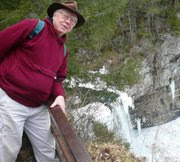
A new series is on the way. Devotees of this blog will recall my series on the Mole, which may be groused out on this site. The new series will focus on the Mad Hermit. In preparation for this series, to which I commit myself with mad eremetical abandon, I pass on the thoughts below--from G.K. Chesterton's The Well and the Shallows-- on the merits of the hermit way. My first Mad Hermit piece is underway, and is called "On Tweeting." Interested?
St. Jerome lived with a real lion; a good way to avoid being lionised.
But he was very sociable with the lion. In his time, as in ours,
sociability of the conventional sort had become social suffocation.
In the decline of the Roman Empire, people got together in amphitheatres
and public festivals, just as they now get together in trams and tubes.
And there were the same feelings of mutual love and tenderness,
between two men trying to get a seat in the Colosseum, as there
are now between two men trying to get the one remaining seat
on a Tooting tram. Consequently, in that last Roman phase,
all the most amiable people rushed away into the desert, to find
what is called a hermitage; but might almost be called a holiday.
The man was a hermit because he was more of a human being; not less.
It was not merely that he felt he could get on better with a lion
than with the sort of men who would throw him to the lions.
It was also that he actually liked men better when they let him alone.
Now nobody expects anybody, except a very exceptional person, to become
a complete solitary. But there is a strong case for more Solitude;
especially now that there is really no Solitude.
The reason why even the normal human being should be half
a hermit is that it is the only way in which his mind can have a
half-holiday. It is the only way to get any fun even out of the facts
of life; yes, even if the facts are games and dances and operas.
It bears most resemblance to the unpacking of luggage. It has been said
that we live on a railway station; many of us live in a luggage van;
or wander about the world with luggage that we never unpack at all.
For the best things that happen to us are those we get out of what has
already happened. If men were honest with themselves, they would
agree that actual social engagements, even with those they love,
often seem strangely brief, breathless, thwarted or inconclusive.
Mere society is a way of turning friends into acquaintances,
rhe real profit is not in meeting our friends, but in having met them.
Now when people merely plunge from crush to crush, and from
crowd to crowd, they never discover the positive joy of life.
They are like men always hungry, because their food never digests;
also, like those men, they are cross. There is surely something the
matter with modern life when all the literature of the young is so cross.
That is something of the secret of the saints who went into the desert.
It is in society that men quarrel with their friends; it is in solitude
that they forgive them. And before the society-man criticises the saint,
let him remember that the man in the desert often had a soul that was
like a honey-pot of human kindness, though no man came near to taste it;
and the man in the modern salon, in his intellectual hospitality,
generally serves out wormwood for wine.
In conclusion, I will take one very modern and even topical case.
I do not believe in Communism, certainly not in compulsory Communism.
And it is typical of this acrid age that what we all discuss
is compulsory Communism. I often sympathise with Communists,
which is quite a different thing; but even these I respect rather
as bold or honest or logical than as particularly genial or kindly.
Nobody will claim that modern Communism is a specially
sweet-tempered or amiable thing. But if you will look up
the legends of the earliest Hermits, you will find a very
charming anecdote, about two monks who really were Communists.
And one of them tried to explain to the other how it was
that quarrels arose about private property. So he thumped
down a stone and observed theatrically, "This stone is mine."
The other, slightly wondering at his taste, said, "All right;
take it." Then the teacher of economics became quite vexed
and said, "No, no; you mustn't say that. You must say it is yours;
and then we can fight." So the second hermit said it was his;
whereupon the first hermit mechanically gave it up; and the whole
lesson in Business Methods seems to have broken down.
Now you may agree or disagree with the Communist ideal, of cutting
oneself off from commerce, which those two ascetics followed.
But is there not something to suggest that they were rather nicer
people than the Communists we now meet in Society? Somehow as
if Solitude improved the temper?



No comments:
Post a Comment